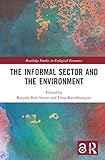The Informal Sector and the Environment / edited by Ranjula Bali Swain and Uma Kambhampati.
Series: Routledge studies in ecological economicsPublisher: Abingdon, Oxon ; New York, NY : Routledge, 2023Description: pages cmContent type:- text
- unmediated
- volume
- 9781032122663
- 9781032122687
- 333.7 SWA 23/eng/20220718
- HD2341 .I53415 2023
| Item type | Current library | Shelving location | Call number | Status | Date due | Barcode |
|---|---|---|---|---|---|---|
 BOOKs
BOOKs
|
National Law School | REFERENCE SECTION | 333.7 SWA (Browse shelf(Opens below)) | Checked out | 30.04.2024 | 39018 |
Includes bibliographical references and index.
Preface
Ranjula Bali Swain and Uma Kambhampati;
1. Introduction Ranjula Bali Swain and Uma Kambhampati;
2. Regulation, governance and the role of the informal sector in influencing environmental quality?
Ranjula Bali Swain, Uma S. Kambhampati and Amin Karimu;
3. Informal emissions Shoghik Hovhannisyan, Constantin Burgi, Santosh Ram Joshi and Ahmad F. Alkhuzam;
4. Exploring the environmental and social impact of informal market practices in the apparel industry
Susanne Sweet;
5. Sustainability priority changes of companies in the informal sector in China under COVID-19
Dongyong Zhang and Stephen Morse;
6. Making small beautiful: Lessons from Mexican leather tanneries and brick kilns Allen Blackman;
7. Youth rural-urban migration in Ethiopia: Environmental drivers and employment in the informal sector
Wondmagegn Tafesse Tirkaso and Abenezer Zeleke Aklilu;
8. The role of the informal economy in solid waste management: The case of IndiaVinish Kathuria;
9. Epidemiological risk perceptions of people living close to open dumps in Nampula, Mozambique: A case study control Alexandre Tocoloa, Ana Paula Martinho and Paula Vaz-Fernandes;
10. Integration of the informal recycling sector in former Yugoslavia: Insights from 20 years of integration projects and initiatives Anne Scheinberg, Jelena Nešić and Arijan Toska
"The informal economy - broadly defined as economic activity that is not subject to government regulation or taxation - sustains a large part of the world's workforce. It is a diverse, complex and growing area of activity. However, being largely unregulated, its impact on the environment has not been closely scrutinised or analysed. This edited volume demonstrates that the informal sector is a major source of environmental pollution and a major reason behind the environmental degradation accompanying the expansion of economic activity in developing countries. Environmental regulation and economic incentive policies are difficult to implement in this sector because economic units are unregistered, geographically dispersed and difficult to identify. Moreover, given their limited capital base, they cannot afford to pay pollution fees or install pollution abating equipment. The informal manufacturing units, often operate under unscientific and unhealthy conditions, further contributing to polluting the environment. The book emphasizes and examines these challenges, and solutions, faced by various sectors of the informal economy, including urban waste pickers, small-scale farmers, informal workers, home-based workers, street vendors, and more. If the informal sector is to "Leave no one behind" (as the Sustainable Development Goals promise) and contribute to "Inclusive growth" (an objective of the green economy), then its impact on the economy as well as the environment has to be carefully considered. This book marks a significant contribution to the literature on both the informal economy and sustainable development, and will be of great interest to readers in economics, geography, politics, environment studies and public policy more broadly. Ranjula Bali Swain is Visiting Professor and Research Director at Center for Sustainability Research (CSR), Stockholm School of Economics, Sweden. She is also Professor of Economics at Södertörn University, Sweden. Uma Kambhampati is Head of School in the School of Politics Economics and International Relations and Professor, Department of Economics, University of Reading, UK"-- Provided by publisher.

There are no comments on this title.